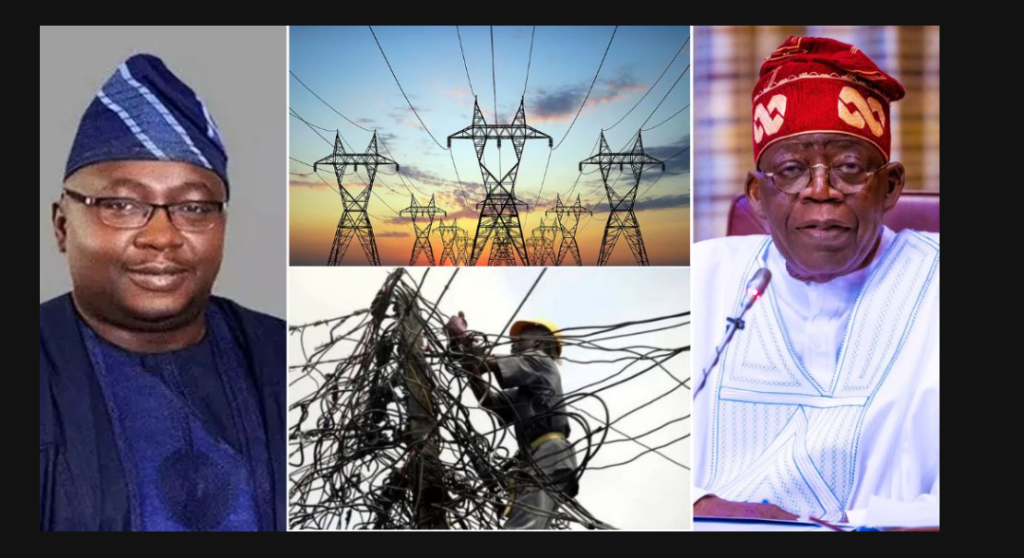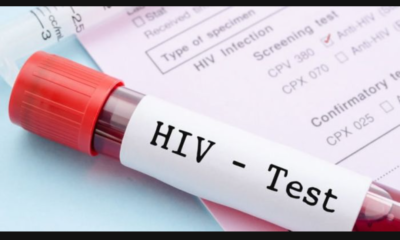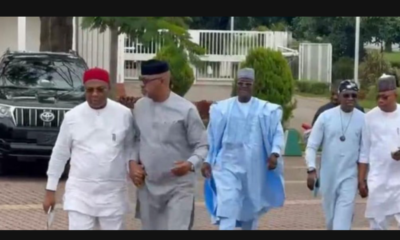Economy
Tinubu’s government asks Nigerians to prepare to pay more for electricity, says no more subsidy
The Federal Government under President Bola Ahmed Tinubu has asked Nigerians to prepare to pay more for electricity, saying there will soon be no more subsidy.

This comes barely two days after the Nigerian Electricity Regulatory Commission (NERC) announced a rise in electricity rates for Band A customers to N225 per kilowatt (kW) from N66.
During a briefing in Abuja, Minister of Power Adebayo Adelabu stated that the recent tariff hike is a trial phase toward eliminating electricity subsidies nationwide.
The government aims to phase out all subsidies in the sector to encourage investment and growth in the power industry.
Adelabu said, “This tariff review is in conformity with our policy thrust of maintaining a subsidised pricing regime in the short run or the short term with a transition plan to achieve a full cost reflective tariff for over a period of, let us say three years.
“I have mentioned it in a couple of media briefings that it is because of government sensitivity to the pains of our people that we will not make us migrate fully into a cost reflective tariff or to remove subsidy 100 percent in the power sector like it was done in oil and gas sector.
“We are not ready to aggravate the sufferings any longer which is why we said it must be a journey rather than a destination and the journey starts from now on, that we should do a gradual migration from the subsidy regime to a full cost reflective regime and we must start with some customers.
“This is more like a pilot for us at the Ministry of Power and our agencies. It is like a proof of concept that those that have the infrastructure sufficient enough to deliver stable power of enjoying 20 hours of light to be the ones to get tariff add.”
The Minister added that the N225 kilowatt per hour Band A customers are charged as little in relative to the N500 they pay for alternative energy like diesel and others.
While explaining that Nigeria is experiencing a subsidy pricing regime where the government provides a large portion of the generation, transmission and distribution cost, he said the government was formerly subsidising 67 percent of the cost of electricity.
“The government would have paid N2.9tr for 2024. This is more than 10 percent of the national budget. It will be insensitive on our part to compel the government to pay such subsidy when we have other competing issues the government needs to fund under pau its of funds we have.”
Meanwhile, Lagos, Kano, and 10 other states have concluded plans to start generating power in their respective states in conformity with the Electricity Act 2023.
It was gathered on Thursday that some of these states had established their electricity market laws and were waiting for the approval of the NERC to have independent regulatory bodies different from the NERC owned by the Federal Government.
In June 2023, President Bola Tinubu signed a new Electricity Act into law, heeding the calls of Nigerians that the power sector be reformed and removed from the exclusive list, to give states the power to generate, transmit and distribute electricity within their jurisdiction. This, Nigerians believe, would help in proffering lasting solutions to the electricity problems in Nigeria.
The new law replaces the 2005 Electricity and Power Sector Reform Act as it seeks to promote private sector investments in the power sector. It provides for a holistic integrated resource plan and policy that recognises all sources for the generation, transmission, and distribution of electricity.
The new act permits the state electricity board or any state authority by whatever appellation, to grant licence for mini-grids and provide the framework for the operation of such licensees. With this, the Federal Government has succeeded in removing electricity from the exclusive list, allowing states and private individuals to invest in the sector.
Though a state can regulate its electricity market by issuing licences to private investors who can operate mini-grids and power plants within the state, the act, however, says that until a state has passed its electricity market laws, the NERC will continue to regulate electricity businesses in such states.
According to a source who spoke with The PUNCH, 12 of the 36 Nigerian states were set to have their own independent electricity regulatory commissions following the enactment of the 2023 Electricity Act.
“This means that, until a state has passed its electricity market laws, NERC will continue to regulate electricity businesses in such states. 12 states have applied to have their regulatory commissions and once the necessary things are done, the NERC will no longer regulate electricity in those states.
“The states will be on their own. That will allow them to generate, transmit and distribute power within their states only. Some of them who have been generating power before the act can now commercialise it and even grant licences to investors to invest in their states,” the source said anonymously.
Another source said, “I can confirm that 12 states have applied to have their regulatory bodies. But I can’t give you the details. Our legal team is still working on the requests by the states.”
Follow us on social media:-

 Health2 days ago
Health2 days ago‘Stunning’ – Experts react to new twice-yearly injection that offers 100% protection against HIV/AIDS
-

 Celebrity Gossip & Gist2 days ago
Celebrity Gossip & Gist2 days ago“When you talk finish, you hug transformer” – Yul Edochie tells Judy Austin’s ex-husband over his allegation
-

 News2 days ago
News2 days ago“9ja to the Universe” – Oyinbo people raise eyebrows as they dance to viral ‘Gwo gwo gwo ngwo’ challenge (Video)
-

 News1 day ago
News1 day agoTinubu meets APC governors as nationwide protest against hardship looms (Video)








